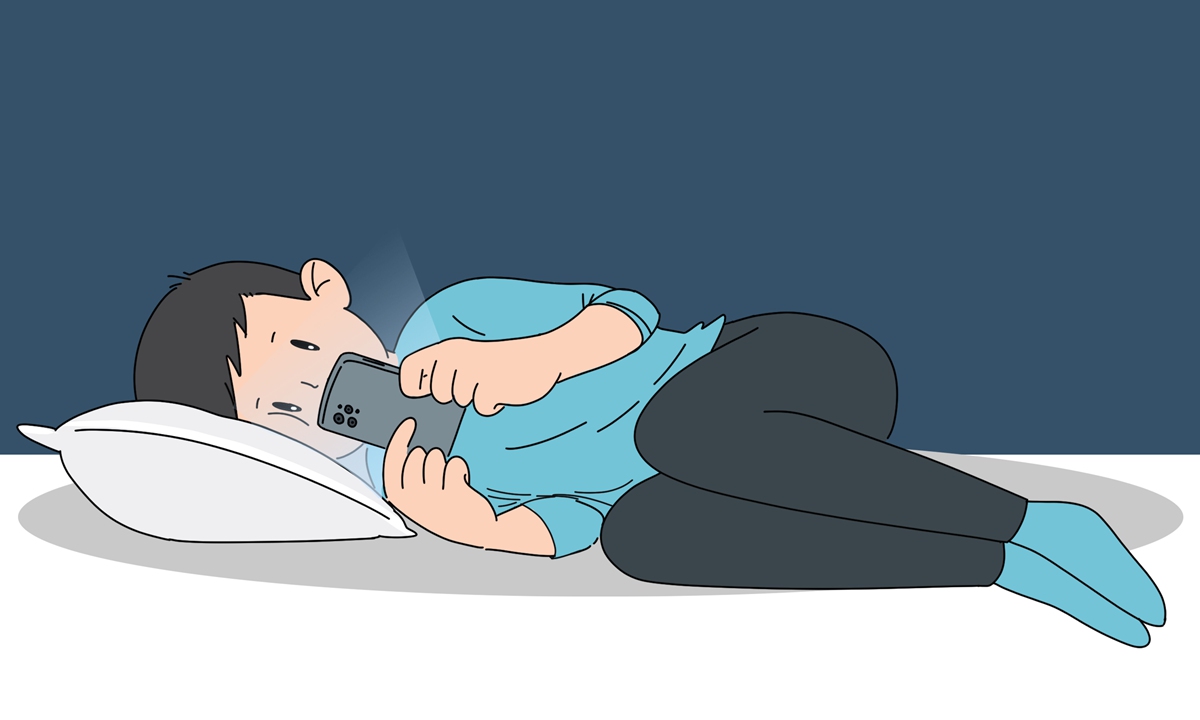
Photo: VCG
A balanced diet, moderate exercise and adequate sleep are three major health standards recognized by the international community. About one-third of a person's life (about eight hours per night) should be spent on sleep. In 2007, the International Agency for Research on Cancer defined circadian disruption as a probable carcinogenic factor. Research shows that people who go without sleep for a long time risk memory loss, anxiety, depression, anger, hair loss, weight gain, high blood pressure and cardiovascular damage.
Sleep is closely associated with not only our health but also social welfare. A Chinese economist proposed an interesting concept based on the theoretical model of economics: The secret of productivity is a time balance between work and sleep. Seeking this optimal equilibrium point and improving the efficiency of deep sleep will bring significant driving forces to the productivity and civilization of a society.
However, people today have been imperceptibly deprived of sleep as an essential physiological requirement and a necessary condition for maintaining health. The 2023 Chinese Sleep Research Report shows that the average sleep duration of Chinese people per night was 7.40 hours.
So why do people sleep less than eight hours? According to the report, conducted by the Chinese Academy of Social Science in 2023, the middle-income group has the shortest sleep duration. A typical example is that of workers in mega-cities who usually work overtime and have long commutes, which take away their sleep time to a degree; in other words, sleep deprivation.
In addition, various sources of stress are related to sleep quality, such as rising prices, housing, transportation, medical care, children's education, employment, income, personal or family health, relationships, marriage, and so on. The appraisal-anxiety-avoidance theory states that when faced with stress, people evaluate the stressors and wonder whether they can handle the stress. If they judge they cannot do it well, they will develop a perception of stress. They may experience negative emotions such as anxiety. At this time, a self-defense mechanism called procrastination will drive people to avoid this pressure. Under these circumstances, sleep procrastination becomes an issue.
Besides this, addiction to smartphones has become the most considerable factor disturbing sleep. Entering the era of short videos, not only young people but also middle-aged and even elderly people have formed implicit dependencies on cellphones, excessively watching videos, browsing micro-blogs, or playing mobile games as a form of relaxation before going to bed. This status, also known as "social sleep," refers to not entering a state of sleep physiologically but simply falling asleep socially, which means they are in "do not disturb" mode and usher in internet solitude time.
Why do they choose social sleep instead of shutting their eyes? At this time, they think they can be themselves and become free without pretending to do anything or care for others' feelings. Despite fatigue, they will enjoy such a period of aimless browsing as compensation for their hard work. Swiss psychiatrist Carl Gustav Jung's theory of analytical psychology says that a persona is a person's publicly displayed image that they use to gain social recognition by leaving a good impression. In this sense, people consume themselves and make great efforts to play various roles to integrate into social environments during the day. Social sleep allows us to draw a demarcation line and enter into a low-energy repair mode, which is more like a way to manage boundaries rather than escape the real world.
Anyway, phones kill precious sleep time, especially for those with weak self-discipline and awareness of sleep health. Under the bonus temptation of some apps, they delay their sleep further. While it is likely to be a vicious circle, less sleep leads to worse energy and feelings like anxiety, which discourage them from facing any pressure and resolving problems. To address this issue, we need to promote sleep knowledge and warn about the dangers of cellphone addiction. Nowadays, we can limit through technical the time a person spends playing games as a way to deal with game addiction. At the same time, there still needs to be a sound solution and sufficient quantitative analysis data for short videos. Sleep deprivation and procrastination caused by mobile phones have already been pervasive problems, so we call for effective social intervention.
Do you remember what you did before going to bed when you didn't have a phone? People usually put a few books by the bedside and gradually fell asleep while reading. Then, we enjoy mental relaxation, which promotes sound sleep. Sleep is essential for maintaining our health, and everyone should take sleep seriously. From now on, when you do anything at the cost of your sleep time, please carefully consider which is your priority.
The author is a faculty member with the School of Applied Economics, Renmin University of China. life@globaltimes.com.cn




